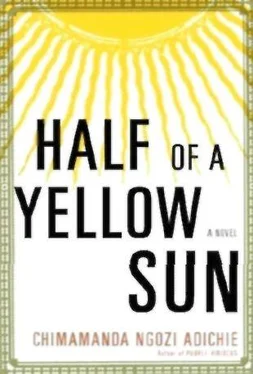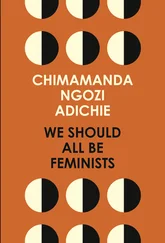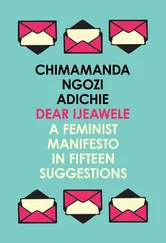Olanna was teaching some children to recite the multiplication tables the morning that Kainene rushed up to the flame tree.
"Can you believe who is responsible for that small girl Urenwa's pregnancy?" Kainene asked, and Ugwu almost did not recognize her. Her eyes bulged out of her angular face, filled with rage and tears. "Can you believe it is Father Marcel?"
Olanna stood up. "Gini? What are you saying?"
"Apparently I've been blind; she's not the only one," Kainene said. "He fucks most of them before he gives them the crayfish that I slave to get here!"
Later, Ugwu watched Kainene push at Father Marcel's chest with both hands, shouting into his face, shoving him so hard that Ugwu feared the man would fall. "Amosu! You devil!" Then she turned to Father Jude. "How could you stay here and let him spread the legs of starving girls? How will you account for this to your God? You both are leaving now, right now. I will take this to Ojukwu myself if I have to!"
There were tears running down her face. There was something magnificent in her rage. Ugwu felt stained and unworthy as he went about his new duties after the priests left-distributing garri, breaking up fights, supervising the scorched and failing farms. He wondered what Kainene would say, what she would do to him, feel about him, if she ever knew about the girl in the bar. She would loathe him. So would Olanna. So would Eberechi.
He listened to the conversations in the evenings, writing in his mind what he would later transfer to paper. It was mostly Kainene and Olanna who talked, as though they created their own world that Master and Mr. Richard could never quite enter. Sometimes Harrison would come and sit with Ugwu but say very little, as though he was both puzzled by and respectful of him. Ugwu was no longer just Ugwu, he was now one of "our boys"; he had fought for the cause. The moon was always a brilliant white, and once in a while the night wind brought the hooting of owls and the rise and fall of voices from the refugee camp. Baby slept on a mat with Olanna's wrapper over her to keep the mosquitoes away. Whenever they heard the far-off drone of the relief planes, nothing like the low-flying swiftness of the bombers, Kainene would say, "I hope that one will manage to land." And Olanna would respond with a light laugh. "We have to cook our next soup with stockfish."
When they listened to Radio Biafra, Ugwu would get up and walk away. The shabby theatrics of the war reports, the voice that forced morsels of invented hope down people's throats, did not interest him. One afternoon, Harrison came up to the flame tree carrying the radio turned up high to Radio Biafra.
"Please turn that thing off," Ugwu said. He was watching some little boys playing on the nearby patch of grass. "I want to hear the birds."
"There are no birds singing," Harrison said.
"Turn it off."
"His Excellency is about to give a speech."
"Turn it off or carry it away."
"You don't want to hear His Excellency?"
"Mba, No."
Harrison was watching him. "It will be a great speech."
"There is no such thing as greatness," Ugwu said.
Harrison walked away looking wounded and Ugwu did not bother to call him; he went back to watching the children. They ran sluggishly on the parched grass, holding sticks as guns, making shooting sounds with their mouths, raising clouds of dust as they chased one another. Even the dust seemed listless. They were playing War. Four boys. Yesterday, they had been five. Ugwu did not remember the fifth child's name-was it Chidiebele or Chidiebube? — but he remembered how the child's belly had lately started to look as if he had swallowed a fat ball, how his hair had fallen off in tufts, how his skin had lightened, from the color of mahogany to a sickly yellow. The other children had teased him often. Afo mrnili ukwa, they called him: Breadfruit Belly. Once, Ugwu wanted to ask them to stop, so he could explain what kwashiorkor was-perhaps he could read out to them how he described kwashiorkor on his writing sheet. But he decided not to. There was no need to prepare them for what he was sure they would all get anyway. Ugwu did not remember the child's ever playing a Biafran officer, like His Excellency or Achuzie; he always played a Nigerian, either Gowon or Adekunle, which meant he was always defeated and had to fall down at the end and act dead. Sometimes, Ugwu wondered if the child had liked it because it gave him a chance to rest, lying down on the grass.
The child and his family had come from Oguta, one of those families who did not believe their town would fall, and so his mother looked defiant when they first arrived, as if she dared anybody to tell her she was not dreaming and would not be waking up soon. The evening they arrived, the sound of the antiaircraft guns cut through the refugee camp just before dusk. The mother ran out and held him, her only child, in a confused hug. The other women shook her roughly, as the wa-wa-wa roar of the overhead planes came closer. Come to the bunker! Are you mad? Come to the bunker!
The woman refused and stood there holding her son, shaking. Ugwu still did not know why he had done what he did. Perhaps it was because Olanna had already grabbed Baby and run ahead of him and his hands were free. But he reached out and pulled the child from the woman's embrace and ran. The child was still heavy then, still weighed something; his mother had no choice but to follow. The planes were strafing and, just before Ugwu shoved the child down the bunker, a bullet flew closely past; he smelled rather than saw it, the acridness of hot metal.
It was in the bunker, while playing with the damp soil that crawled with crickets and ants, that the child had told Ugwu his name. Chidiebele or Chidiebube, he was not sure. But it was Chidi-something. Perhaps Chidiebele, the more common name. The name almost sounded like a joke now. Chidiebele: God is merciful.
Later, the four boys had stopped playing War and had gone inside when Ugwu heard the thin, strangled wail from the classroom at the end of the building. He knew that that child's aunt would come out soon and bravely tell the people nearby, that the mother would throw herself in the dirt and roll and shout until she lost her voice, and then she would take a razor and leave her scalp bare and bleeding.
He put on his singlet and went out to offer to help dig the small grave.
Richard sat next to Kaineneand rubbed her shoulder as she laughed at something Olanna was saying. He loved the way her neck looked longer when she threw back her head and laughed. He loved the evenings spent with her and Olanna and Odenigbo; they reminded him of Odenigbo's dimly lit living room in Nsukka, of tasting beer on his pepper-drenched tongue. Kainene reached out for the enamel plate of roasted crickets, Harrison 's new specialty; he seemed to know just where to dig for them in the dry earth and how to break them up into bits after roasting, so that they lasted a bit longer. Kainene placed a piece in her mouth. Richard took two pieces and crunched slowly. It was getting dark, and the cashew trees had become silent gray silhouettes. A dust haze hung above them all.
"What do you think accounts for the success of the white man's mission in Africa, Richard?" Odenigbo asked.
"The success?" Odenigbo unnerved him, the way he would brood for long moments and then abruptly ask or say something unexpected.
"Yes, the success. I think in English," Odenigbo said.
"Perhaps you should first account for the failure of the black man to curb the white man's mission," Kainene said.
"Who brought racism into the world?" Odenigbo asked.
"I don't see your point," Kainene said.
"The white man brought racism into the world. He used it as a basis of conquest. It is always easier to conquer a more humane people."
Читать дальше












